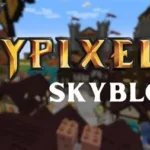In this article, I will discuss the Best Decentralized Science Projects that are changing the way research is done.
These projects are novel initiatives that use blockchain technology to facilitate better interaction, improve data sharing, and promote accountability in science.
These projects enhance community engagement and drive open access. In so doing, they are unlocking new possibilities for scientific advancement and changing many aspects of the world for the better.
Key Point Best Decentralized Science Projects Lits
| Project | Key Point |
|---|---|
| Molecule | Focuses on creating a marketplace for biopharmaceutical data, facilitating data sharing for drug development. |
| VitaDAO | A decentralized autonomous organization that funds and supports longevity research projects using shared data. |
| Cerebrum DAO | Aims to leverage decentralized finance (DeFi) to democratize access to health data and support medical research. |
| AthenaDAO | Concentrates on creating a data economy for scientific research, empowering researchers to monetize their data. |
| Sci2Sci | Facilitates collaboration among scientists by enabling them to share and access data easily through decentralized means. |
| BeakerDAO | Focuses on creating a decentralized platform for scientific experimentation and data sharing among researchers. |
| SciNet | Aims to create a global network of researchers to share and utilize scientific data efficiently. |
| LabDAO | Empowers laboratories to share their data and resources, enhancing collaboration in scientific research. |
| Data Lake | Aims to provide a secure repository for scientific data, enabling seamless access and sharing among researchers. |
10 Best Decentralized Science Projects of 2024
1. Ocean Protocol
Ocean Protocol is a decentralized data exchange protocol that enables private and secure data sharing and payment.
It enables data owners to keep control of the data while at the same time setting limits on how data is used so that a data economy, where data resources are tokenized and exchanged, can flourish.
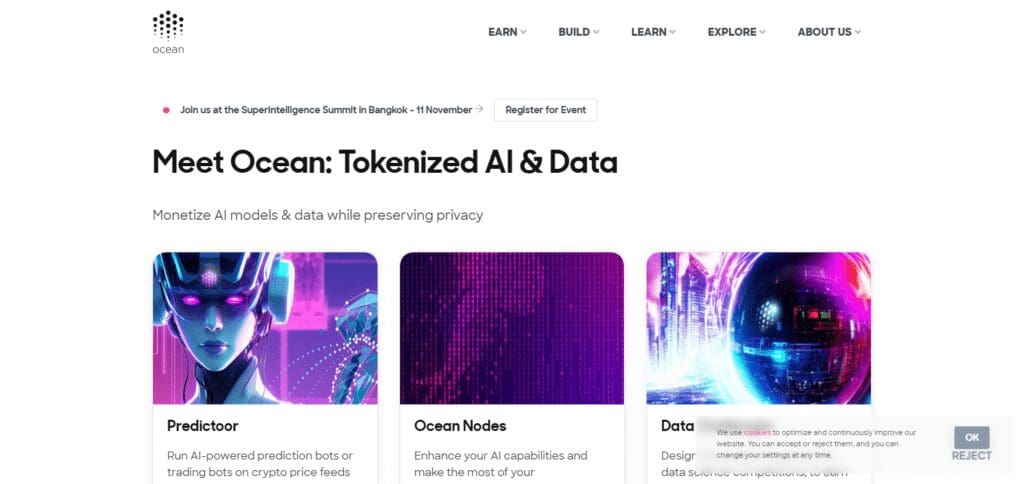
Ocean Protocol facilitates smooth and secure transactions between data providers and data consumers through its marketplaces and decentralized finance tools, which promotes inter-sectoral integration in health, AI, and finance.
Ocean Protocol seeks to democratize data as a resource and encourages innovation whilst safeguarding moral data usage and ownership by transforming data into an easily available and privacy-respecting asset.
Ocean Protocol Features
Data Tokenization: Represents the transformation of information into a digital medium and makes it tradable and profitable in the blockchain context.
Compute-to-Data: Offers a privilege-masking method by letting algorithms operate with the data but not giving access to the data.
Access Control Layer: Determining the terms and consent of the data users for safe and regulated data exchange.
Incentivized Data Sharing: Compensates with extra benefits the owners of data so that they would share the data within the global economy.
2. Molecule
Molecule aims to improve the pharmaceutical development process by establishing a marketplace for biopharmaceutical data.
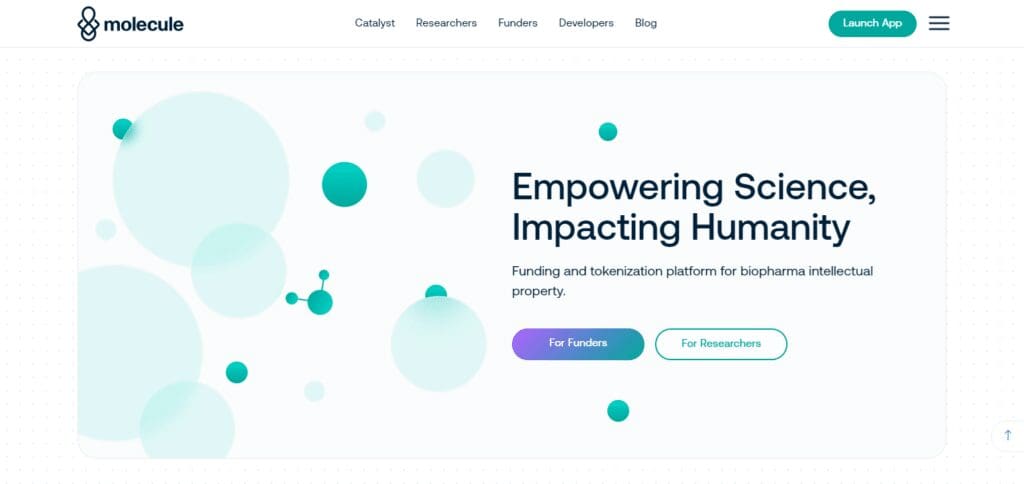
With Molecule’s decentralized platform, which binds patients, researchers, and pharma companies, all research data can be shared, which speeds up the process of developing new drugs.
This marketplace approach permits innovators to own their data while more efficient access to it can be provided for quick progress in medicine.
Molecule Features
Research Tokenization: This makes it possible for academics to divide research materials and make their research tradable.
Funding Marketplace: Directly and easily connects researchers and funding for collaborative purposes in biotech.
IP-NFTs: Uses NFTs to represent property rights to intellectual property, which enables ownership of property transparently.
Decentralized Biotech Collaborations: Allows biopharma research to be performed and funded by worldwide collaboration without middlemen.
Community Governance: Engages relevant community members and stakeholders through voting on their desired funding areas and project endorsement.
3. VitaDAO
A Decentralized Autonomous Organization (DAO) created with the goal of financing and promoting research associated with Longevity is VitaDAO.

VitaDAO facilitates research projects by gathering resources together and enabling scientists to access useful datasets through Ocean Protocol’s data-sharing network.
In this case, VitaDAO’s community enables the research funding to be not only accessible but also encompass catastrophic breakthroughs in age-related studies through members voting on projects that should be supported.
VitaDAO Features
Longevity Research Focus: This is focused on providing funds for and promoting research in health and longevity, which is related to age.
Tokenized Ownership of Research: All of the token holders are voters and owners of the funded thesis by means of tokenization.
Community-driven Funding: Research funding can also be proposed, reviewed, and voted for by community members.
Partnership with Research Institutions: Works with universities and biotech companies to speed up innovative research.
4. Cerebrum DAO
By advancing the concepts inherent in Decentralized Finance (DeFi), Cerebrum DAO intends to demystify healthcare data and enhance the ease of studying as well as clinical practices.
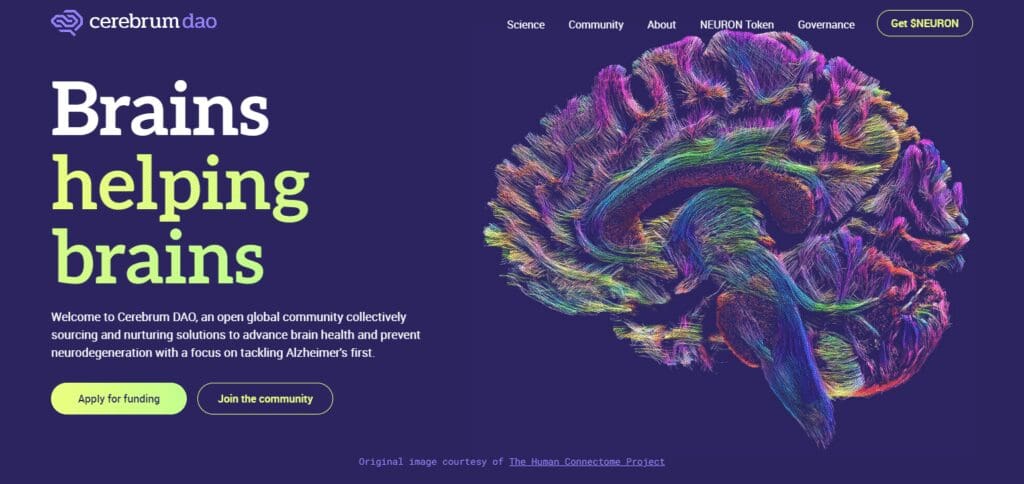
The advantage of using Ocean Protocol makes it possible for Cerebrum DAO to build an ecosystem where data is shared outside of the traditional silos of security.
Privacy enhances transparency and thus encourages faster treatment and healthcare solutions while preserving the data sovereignty of the participants.
Cerebrum DAO Features
Mental Health Research Funding: Aims to fund projects that are focused on innovation within neuroscience and mental health practices.
Decentralized Research Governance: Enables community members to make decisions about the direction of research and its funding.
Collaborative Data Sharing: Provides means of secure exchange of mental health and neuroscience data for joint efforts.
Cross-Disciplinary Partnerships: Unites neuroscientists with clinical practitioners and other researchers for purposes of interdisciplinary research.
Transparent Research Progress: Offers news and great detail on the presently funded research activities and their progression.
5. AthenaDAO
AthenaDAO promotes the development of a decentralized data economy that focuses on a specific end goal, which is the advancement of science.

With the help of Ocean Protocol’s secure and encrypted data marketplace, AthenaDAO enables researchers not simply to safeguard their data, but to sell it as well.
Such a model encourages practices of open science by guaranteeing the availability of data to the relevant audience and establishing an environment whereby scientists can fund their research through paid data sharing.
AthenaDAO Features
Women’s Health Research Focus: Provides funding to women’s health researchers and practitioners.
Crowdsourced Research Initiatives: Participates the public in selecting and prioritizing interesting and important research questions.
Inclusive Data Governance: Puts individual participants in a position to make decisions about data use and project funding together.
Data Ownership for Participants: Guarantees that any researcher or contributor associated with the data holds and retains ownership of it.
Grant and Fellowship Programs: Presents grants and fellowships to advance preliminary studies about women’s health.
6. Sci2Sci
Sci2Sci aims to eliminate these limitations by integrating a decentralized platform into scientific processes and enabling researchers to exchange and access a wide variety of data.

Thanks to Ocean Protocol technology, Sci2Sci helps create a network of scientists around the world while protecting the privacy of individual users and ensuring the efficient use of important resources in the pursuit of research goals.
Sci2Sci Features
Peer-to-Peer Research Collaboration: The scientists interact directly on the same platform and share data and findings.
Decentralized Knowledge Exchange: It allows scientific information to be shared across disciplines with no central control.
Research Data Crowdsourcing: It allows scientists to obtain data from people around the world as contributors to deepen the study.
Open-Source Publishing Model: Encourages researchers to publish their studies with no restriction and to make the studies available at no cost.
Funding for Collaborative Projects: It offers resources that help to promote scientific pursuits across different institutions and countries.
7. BeakerDAO
BeakerDAO bases its operations on the idea of encouraging more people to conduct science by offering them a space where they can openly share how experiments are done.
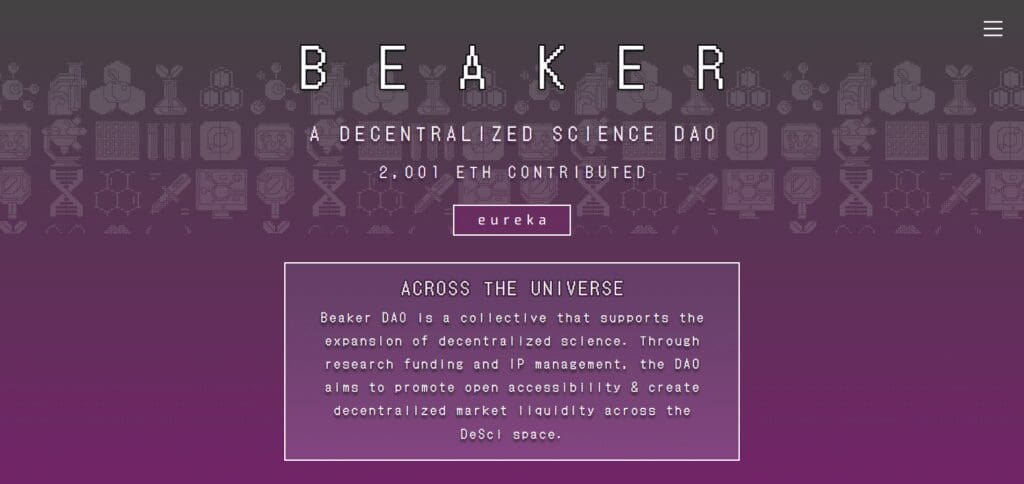
Ocean Protocol helps BeakerDAO construct a one-stop-shop where researchers can publish how they conducted their experiments and what they discovered, accelerating scientific advancement.
This assists in the elimination of unnecessary repetitions of experiments and speeds up the rate of innovation by using existing information.
BeakerDAO Features
Equipment Reuse: Encourages researchers to network and utilize laboratory equipment and resources owned by other parties in a decentralized manner.
Preliminary Experimentation Funding Pools: Offers financial pools to fund initial experimental research and development processes.
Constructive Collaboration with Protocols: Aids in the creation and distribution of experiments and their respective protocols.
Collective Assessment Mechanism: Provides access to peer review functions that are provided by the community to ensure greater openness and authenticity of the research.
Collective Intellectual Property Right Models: Creates conditions for the establishment of cooperative frameworks for IP developed in the DAO.
8. SciNet
SciNet’s goal is to create an international community of researchers that will facilitate the exchange of data and ideas.

SciNet leverages the Ocean Protocol’s infrastructure to link scientists to a dispersed data resource, which is often a hallmark of academic and scientific investigations.
Such a linked network enhances the effective use of data and efforts of inter-disciplinary collaboration.
SciNet Features
Global Research Network: Researchers all over the world come together to offer their specialized skills and work together on scientific endeavors.
Real-Time Data Access: Gives users the ability to view data sets presented in a user-friendly interface instantly.
Incentivized Contributions: Participants who contribute by making data, resources, and expertise are compensated.
Interdisciplinary Collaboration Tools: Tools to enable people from different scientific areas and fields to work together are provided.
9. LabDAO
LabDAO creates an environment where laboratories exchange data and resources, which helps accelerate collaboration in different research fields.
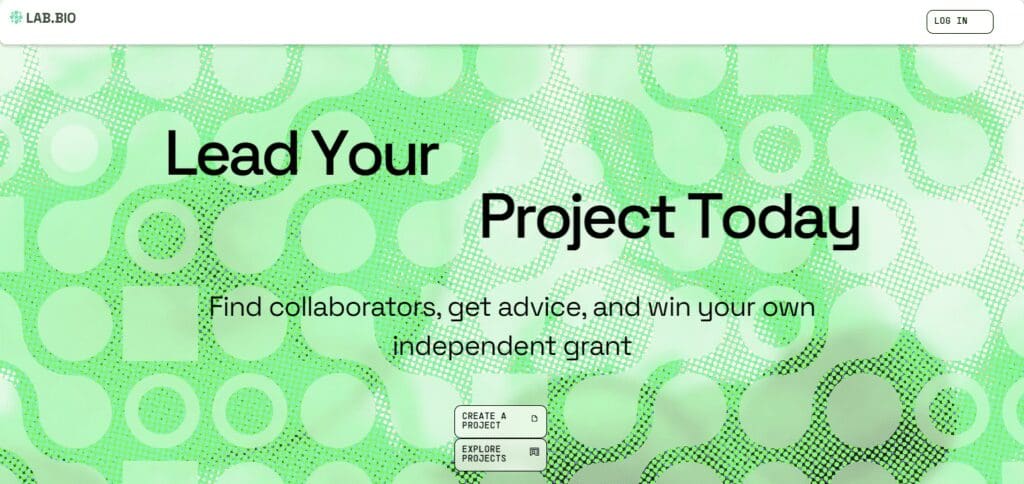
Using Ocean Protocol’s technology, LabDAO allows laboratories to transfer data in a safe manner, which, in turn, increases the efficiency of research and advances scientific solutions.
This ecosystem of shared data encourages not only big institutions but also smaller labs and thus promotes equity in innovation.
LabDAO Features
Decentralized Lab Governance: This gives authorization for lumps to exist and be managed in a decentralized governance structure, encouraging teamwork for decision-making.
Funding and Mentorship Support for New Research Projects: Provides incubation of new promising ideas through funding and mentoring.
Enablement of Data Sharing and Easy Access: This practice enables researchers to have access to share research data openly, which allows reproduction and collaboration.
Stimulation of Stakeholders’ Participation and Contribution: These implements offer rewards for stakeholders to engage in a particular lab project.
10. Data Lake
Data Lake is a secure storage site for scientific data with the purpose of facilitating access and data sharing among researchers.
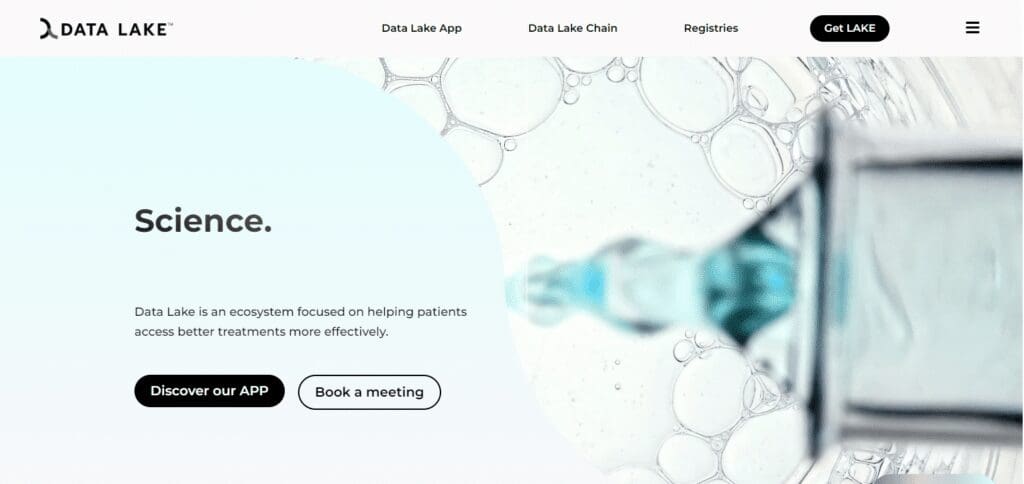
Through the aid of Ocean Protocol, Data Lake offers data management through a distributed system whereby researchers are guaranteed that they can access relevant data without compromising its confidentiality.
This assists in lowering barriers to access and embraces the culture of open data in science.
Data Lake Features
Highly Scalable And Expandable Data Infrastructure: Offers an easily expandable infrastructure for the collection and storage of scientific data of any volume.
Multiple Data Formats Are Available: This brings together different types of data for integrated and comprehensive analysis by supporting numerous formats as well.
Secure Data Storage And Access: Protects and manages the privacy of its users with secure sharing and high-level access controls suitable for censored data.
Streamlined Data Sharing Processes Among Users: Aids cross-institutional and researcher-level data sharing and discovering processes.
Assorted Analytics And Visualization Tools: These tools also provide a convenient way to visualize data through integrated analytics and visualization functionalities.
How To Choose The Best Decentralized Science Projects?
When selecting the most appropriate decentralized science projects, several factors interrelated to any other take precedence:
Project’s Aim
In what way do the project’s goals resonate with areas of preference such as health, environment, or technological advancements that the individual may want to pursue?
Community
Check the projects that indicate the existence of community activity around them. Such communities may cooperate better, share resources, and sustain projects.
Transparency and Accountability
Investigate the type of governance provided in this project. If stakeholders are able to make decisions transparently then accountability is also assured.
Technology
Try to evaluate the technology and infrastructure base utilized by the project. For effective data management and sharing, it is vital to have robust, scalable, and secure systems in place.
Partnerships and Collaborations
Consider the project’s linkages to other academic institutions, research organization (s), or the industry since this improves credibility and resource availability.
Funding
Determine the sources of funding for the project and the plans in place for the future sustainability of the venture. Activities that are relevant and funding sources that are reliable can aid the success in continual development and support.
Outcomes
Study the history of the project and, in particular, its results and the expected effect on the scientific community. Many projects, because of their successful objectives, usually have some outcomes and contributions within their respective fields.
User Experience
Analyze the interface or tools developed to assist the project’s users. Wider participation and accessibility of tools and features further solicit more collaboration.
In so doing, you should be strategic when choosing which decentralized science projects to engage with depending on your personal preferences and objectives.
Conclusion
In summary, the rise of decentralized science projects has changed the scope of conducting and sharing research in various fields.
These projects use blockchain technology and decentralized governance to enhance collaboration, improve data-sharing, and increase transparency in scientific research.
By equipping communities, fostering open knowledge, and rewarding people’s contributions to the projects, decentralized science initiatives such as Ocean Protocol, Molecule, and VitaDAO are working around these complex problems.
Collaboration among researchers, institutions, and funders that use these models will hasten advancements, discoveries, and progress in science for a more equitable and harmonious future in research.










